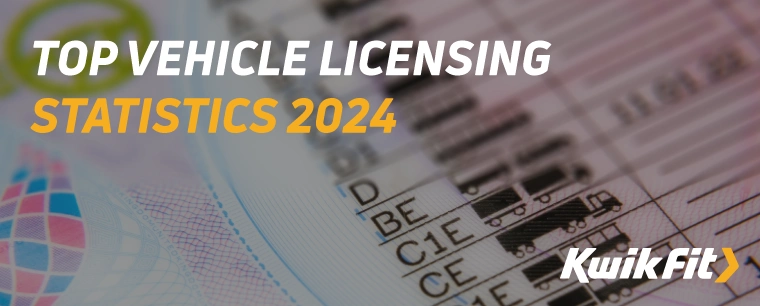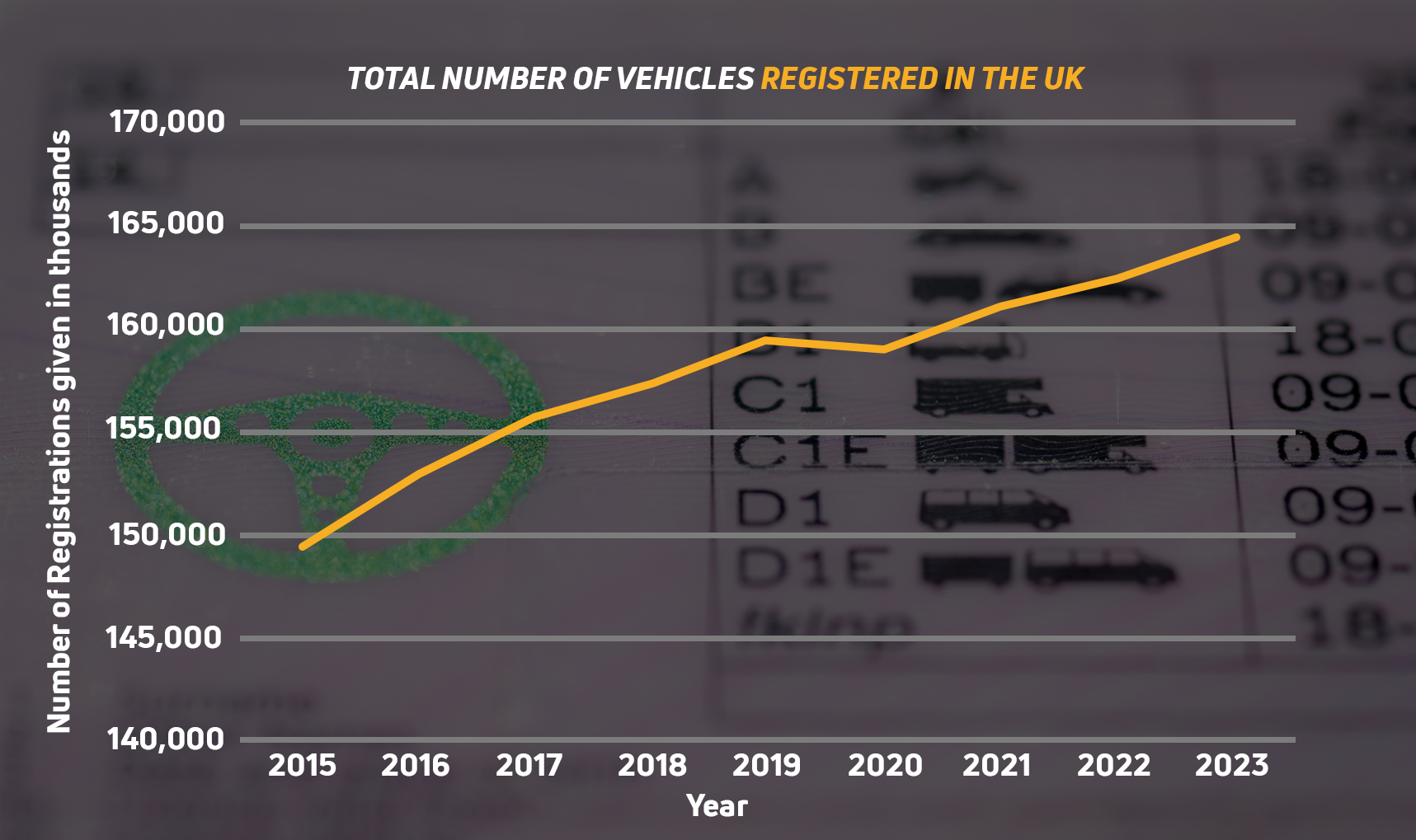The Top Vehicle Licensing Statistics 2024
Jack Dreyer | Monday 8th July 2024 12:00pm

Every year, the Department for Transport and the DVLA release vehicle licensing data that provides crucial insights into how many new vehicles have been registered, the vehicle types rising or declining in popularity, as well as the number of vehicles registered as SORN.
We looked at the data and saw some startling statistics – here’s what we found.
Almost 11% growth in total number of vehicles licensed since 2015
In 2015, the total number of vehicles registered in the whole of the UK was around 149.5 million – this is primarily made up of cars but also includes buses, coaches, motorcycles, and other vehicles like tractors and diggers. This chart also shows the totals without differentiating between private and commercial registrations (such as for fleet vehicles, rental vehicles, or company cars).
This rose to an incredible 164.5 million vehicles by 2023 – representing an 11% growth.

What this also means is that, with a population of over 67.6 million people, there’s an average of almost three vehicles per person!
Over 23% decline in new vehicles since 2002
While the total number of registered vehicles has risen in the last few decades, the number of newly registered vehicles has dropped by 23.3% since 2002. From a total of 3.2 million newly registered vehicles in 2002 to nearly 2.5 million newly registered vehicles in 2023.
This can mean one of two things:
- There’s less demand for new vehicles
- There’s less production of new vehicles
These two possibilities can also be intimately related – if there’s less demand for new vehicles, production tends to stagnate (or, sometimes, artificially inflate in order to try kickstarting demand).
So why a lack of demand? We could probably spend all day listing possible reasons for people buying fewer cars – the 2008 financial crash, lots of geopolitical uncertainty, stagnating wages, and so on – but one possibility is simply that new cars have become much more dependable and long-lasting.
This possibility is, however, given a run for its money with this last statistic.
180% increase in cars registered as SORN
A rather startling statistic is that, since 2009, there’s been an eye watering 180% increase in the number of cars registered as SORN. It was around 8 million vehicles in 2009 and has grown to almost 23 million vehicles in 2023.
To be clear, registering the car as SORN means that the owner still owns the car but doesn’t use it – so it’s not the same as the number of cars scrapped (which you’d expect to rise roughly in line with number of cars registered). Ultimately, this means that the vehicle’s owner wanted to keep it for sentimental reasons or due to intending to pay for repairs at a later date.
Perhaps this indicates a shift in perceptions of “classic cars” from the quirky early “motorcars” (think Toad of Toad Hall) to models that were fairly widespread in the 1980s.

Making your car last longer
If we agree that the number of new car registrations is due to drivers becoming less able to afford new cars, then it’s crucial that you make sure to maintain your car, van, or SUV.
Things like regular cleans, frequent tyre checks, and occasional engine oil checks seem like a chore at the time of doing them, but are the best way to keep your car in top condition. It’s like brushing your teeth, cleaning & checking a car doesn’t seem to do much in the short term, but your car (and wallet) will thank you for it after twenty years.
Upkeep and vehicle maintenance doesn’t have to break the bank
Checking a vehicle ensures you catch possible problems before they become real problems, but the best way to ensure you have a thorough check and deep clean of everything important is to have your car serviced every 6-12 months. A lot can happen to a car over a year of driving, so it’s crucial to keep up with this regular interval so that everything’s always working as it should.
And this maintenance doesn’t need to break the bank. The experts at your local Kwik Fit centre are always on hand to help with anything from oil & oil filter changes to more comprehensive servicing & repairs – all for honest prices.
To find out more about the services that we offer or how we can help, visit our services page, stay up to date with our blogs, or simply pop into your local Kwik Fit Centre.
Any facts, figures and prices shown in our blog articles are correct at time of publication.
Featured Articles
Is it Illegal to Drive With One Headlight?
Saturday 19th July 2025
Wondering if it’s illegal to drive with one headlight? Learn about the safety risks and penalties of illegal blown bulbs and why you should fix them promptly.
Air Con in EVs & Hybrids: Experts Answer Your Questions
Monday 30th June 2025
Does air con drain EV batteries? Can you use the air con while charging an electric car? Find out the answers to these questions & more from Kwik Fit’s experts.
Why Is Your Car Making a Noise? Fixes & Tips
Friday 13th June 2025
When your car starts making unexpected noises, it can certainly be quite disconcerting; it may be nothing to worry about, but here’s what you need to know.









